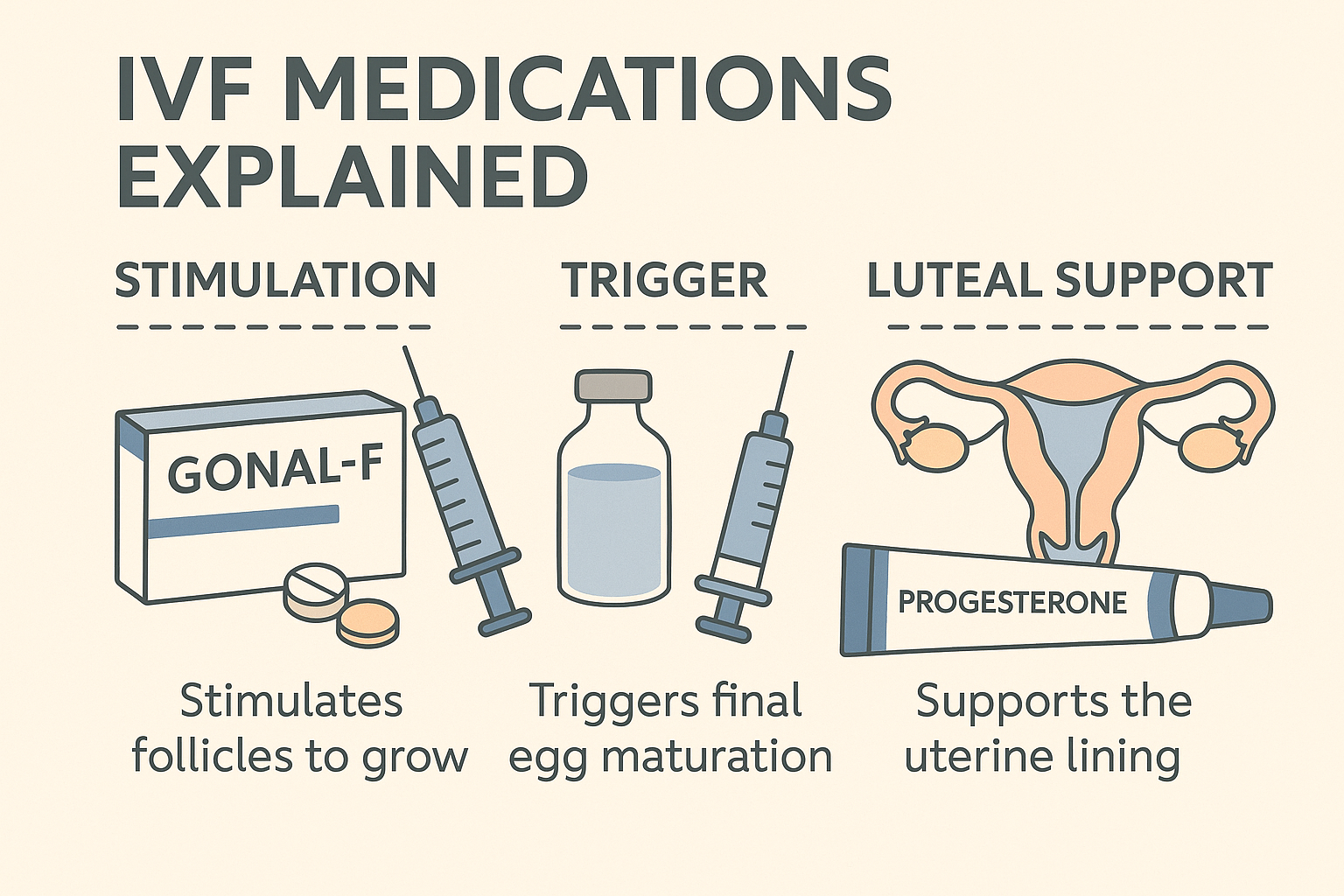When patients begin an IVF cycle, one of the first questions they ask is about medications. Most have heard about the injections, but few understand what these drugs do, how long they’ll be needed, and whether the meds are included in their package or must be sourced separately. For international patients, this often becomes a source of stress or delay. Here’s a clear overview.
What IVF Medications Actually Do
IVF medications mimic and support natural hormonal processes in the body, but in a controlled and optimized way. The goal is simple: produce more than one egg, time ovulation precisely, and create the right environment for embryo implantation.
The first group, ovarian stimulation drugs, are given early in the cycle. They stimulate the ovaries to grow multiple follicles instead of just one. More mature eggs mean more chances to create viable embryos. These are typically administered as daily injections for about 10 days. Learn more about ovarian stimulation medications from the American Society for Reproductive Medicine.
Once follicles reach the right size, a single “trigger shot” is given. This injection prompts the eggs to undergo final maturation, making them ready for retrieval. The timing is critical and egg retrieval happens around 36 hours after the trigger.
After embryo transfer, progesterone and sometimes estrogen are given to support the uterine lining. These medications help create and maintain a receptive endometrium, increasing the likelihood of successful implantation. This phase is called luteal support and typically continues until a positive pregnancy test, and often for several weeks beyond.
Understanding the IVF Injection Schedule
Most patients start with stimulation injections around day two or three of their menstrual cycle. These are done once or twice a day depending on the protocol. Monitoring appointments (ultrasounds and blood tests) track how follicles respond. Toward the end of this phase, doses may be adjusted, or additional medications added to prevent premature ovulation.
Once follicles are ready, the trigger shot is administered, followed by egg retrieval under anesthesia. Luteal phase medications begin shortly after, even if embryos are frozen instead of transferred right away.
While many patients worry about the injections, they’re usually given with small needles just under the skin. It’s normal to feel nervous at first, but most people manage the routine quickly and with minimal discomfort.
Why Protocols Differ Between Patients
Not all IVF cycles follow the same plan. Your doctor may choose a short protocol, a long protocol, or one that uses an antagonist or agonist approach. These decisions depend on factors like age, ovarian reserve, previous IVF response, or risk of ovarian hyperstimulation syndrome (OHSS).
For instance, patients with low AMH may benefit from a shorter, more aggressive protocol to get any available eggs. Younger patients with high ovarian reserve might need a gentler plan to avoid overstimulation.
Even the type and dose of medication can vary widely between patients. That’s why all protocols at SILK Medical are custom-made, based on hormone levels, medical history, and test results.
Are Medications Included in SILK Medical IVF Packages?
Yes, if you choose the full IVF cycle package, for example, the $7,000 program, medications are included along with procedures, consultations, monitoring, and embryo freezing. This bundled approach helps keep things simple and cost-effective.
Patients who choose to split services, for example, only doing embryo creation without transfer, may see medication costs listed separately. In those cases, the total price for medical procedures will be lower, and will include a personalized stimulation protocol with all prescribed medication needed for that stage.
For egg donation cycles, the donor’s medications are covered in the program fee. Donor compensation and medication costs are part of the first payment stage, and you won’t need to purchase anything extra.
Can You Bring Medications from Another Country?
Yes, in most cases. Patients often start stimulation at home using medications prescribed by the SILK Medical doctor. They can then travel to Tbilisi for the final days of monitoring and the egg retrieval. This approach helps minimize time spent abroad and is often preferred by working professionals or those with children.
If you’re planning to bring your own medications, it’s essential to confirm the exact drugs and doses with SILK’s medical team in advance. Some brand names vary between countries, and substitutes might be needed. Also note that some customs agencies may ask for proof of prescription when traveling with medication.
If you’re starting stimulation locally, SILK doctors can still provide your protocol and review your scans and bloodwork remotely. This flexibility has made the process smoother for patients flying in from North America, Europe, and Asia.
When to Ask and What to Clarify
Before starting the cycle, patients should ask:
- Which meds are included in my program?
- Will I need to buy anything separately?
- Can I begin injections at home or must I travel before day one?
These are routine questions and should be clarified during the planning phase. The clinic provides full protocols in advance, including dosage, start dates, and injection instructions.
If you need more detailed medical explanations or support reviewing your local medication plan, the team at SILK Medical can advise based on your lab results and reproductive history. Every case is different, and the right protocol can make a significant difference in outcomes.


